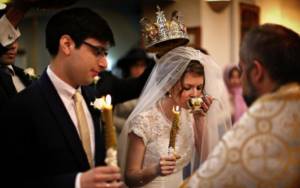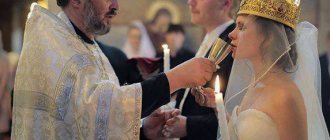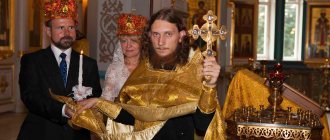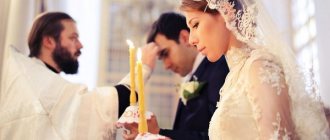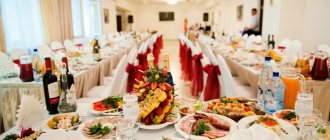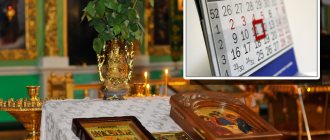Is it possible to get married in a church during the Nativity, Assumption, and Petrov fasts?
You cannot get married during Lent.
The Orthodox Church makes many restrictions regarding weddings. The Russian Orthodox Church says that newlyweds cannot get married :
- During Lent (Great Lent - 7 weeks before Easter, Petrovsky Lent - in 2021 from June 12 to July 11, Assumption Lent - from August 14 to 27, Rozhdestvensky Lent - from November 28 to January 6)
- Tuesday, Wednesday, Saturday
- During the New Year's holiday (from January 7 to January 19)
- During Easter and the rest of the week
- 1 day before the celebration of the twelfth holidays and on holidays (wedding is not prohibited, but not recommended)
- On the days of temple festivals (each church has its own temple festival) and 1 day before the holiday
- During Maslenitsa week (the last week before Easter Lent, called Great Lent, during this week weddings are not prohibited, but are not recommended)
- 1 day before the feast day of the Beheading of John the Baptist (September 11) and on the day of the feast
An exception to the charter can be made by the bishop who rules the church where you are going to get married.
So, there are many days prohibited for weddings; in 2021, in Russia, newlyweds can get married on 116 days out of 365.
The Russian Orthodox Church adheres to the strictest rules. In Western Europe, Orthodox churches are not so strict about the days allowed for weddings; Saturday and Sunday are the main days here when newlyweds get married. In Greece and Romania you can get married on Peter's fast, in Cyprus - on both summer fasts.
According to the church charter, if the local priest married you in church on an unauthorized day, the marriage is still valid.
Note : Twelfth holidays:
- January 7 – Nativity of Christ
- January 19 – Baptism of Christ
- February 15 - Presentation of the Lord
- April 7 - Annunciation
- 1 week before Easter – Palm Sunday
- Fortieth day of Easter - Ascension of the Lord
- Fiftieth day of Easter - Trinity
- August 19 – Transfiguration
- August 28 - Assumption of the Virgin Mary
- September 21 - Nativity of the Virgin Mary
- September 27 – Exaltation
- December 4 – Presentation of the Virgin Mary into the Temple
What is a wedding for?
The wedding itself is a whole rite, a tradition that must be understood inside and out. It has its own clear and strict rules that are strictly followed. Many are sincerely surprised, but the wedding ceremony is carried out much more strictly and clearly than the painting in the registry office.
Therefore, before the newlyweds decide on such a ritual, it is worth studying it well and strictly following all the established rules:
- A wedding necessarily involves purification, that is, fasting. A few weeks before the procession, young people should give up harmful foods, alcoholic beverages and cigarettes. In this way, not only the body will be cleansed, but also subsequently the soul.
- Think about why you need an alliance in the face of God. Are you really ready for this? It is best to discuss this issue with the priest, who will conduct the procession. He will tell you in detail the history of the wedding and its necessity. Talk to the priest about your concerns and ask permission to perform the ceremony.
Important! In many churches, priests refuse to perform the ceremony until they personally meet the young spouses. The priest always communicates with the young family, finds out their goals and desires. Only then does he pronounce a verdict on the need for such an alliance. Such a decision can be positive only if the love relationship is by mutual consent, proceeds in peace and mutual love.
- Both family members must be of the same faith. Otherwise, a non-Christian cannot undergo the wedding process in the Orthodox Church. In such cases, it is permissible for one of the spouses to change their faith by being baptized.
- The bride should choose a decent outfit. He must be closed and modest. Don't forget about your headdress. In this case, the choice of most ladies falls on a veil, although an ordinary scarf can also be used.
- Makeup should be natural. It is not forbidden to apply it, but you should not overdo it. Light shadows, light lipstick and natural blush. This will be enough to highlight the natural beauty. Smoky-eye makeup looks out of place.
- During the ceremony, the eyes of the bride and groom should be directed towards the priest. Naturally, at this time all kinds of conversations and grins are prohibited. Newlyweds should be as focused and serious as possible. Strictly follow what the priest tells you.
- It is strictly forbidden to be late for the ceremony. If you invite guests to it, it is better to tell them the time 20-25 minutes before the appointed time. There is nothing wrong with having to wait your turn. This is much better than being late for such an important and serious ceremony.
- If a young family wants to capture such a tender and touching moment on camera, then they should discuss this issue with the clergyman in advance. If he gives his consent, then you can invite a photographer, having discussed with him the issue of appearance and etiquette.
- In the hall, women stand on the left side, and men on the right. Both the newlyweds and everyone present should behave modestly and quietly. All gadgets and mobile phones must be turned off in advance. Apart from the priest, no one should utter sounds or make rustling noises.
Important! You will have to stand for a long time at the ceremony, so you should not invite “extra” people to it. It’s better to invite only your closest family members. Children should be abandoned for a short time on this day, as this kind of procession is very difficult for them.
How long before the wedding should you fast?
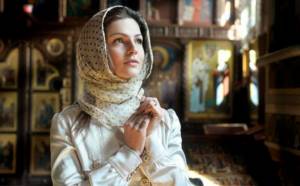
Before the wedding, the Orthodox Church advises fasting not only the body, but also the soul - to realize all sins and repent. A few days before the wedding, the bride and groom need to come to confession and receive communion.
How is confession and communion ?
- First of all, a few weeks before the wedding, find out the schedule of services at the church you are going to attend.
- Confession and communion take place after the evening or morning service.
- You need to prepare for confession for 1 week, and if there is no time, then 3 days, no less.
- On the eve of visiting church, you need to remember what sins you have and write them down on a piece of paper, so that you don’t forget to tell the priest later, since a sin not mentioned during confession will remain unforgiven.
- In the days preceding communion, you need to make peace with everyone with whom you quarreled and ask for their forgiveness.
- Also, you cannot swear, have fun, or have sex at this time.
- You need to fast all week - do not eat meat, dairy, or eggs.
- Read prayers in the morning and evening. In addition to daily prayers, you need to read the Canons of Repentance to the Most Holy Theotokos Mary, Christ and the Guardian Angel.
- For women . Calculate in advance when your monthly bleeding should occur, since you can enter the church only after the complete cessation of menstruation.
- If you are going to confession in the morning, after midnight adults cannot eat, drink or drink; only children under seven years of age can eat and drink.
- Come to church before the service begins, listen to the prayers heard in the temple and repeat them to yourself.
- After the service, everyone who wishes to confess takes turns approaching the priest and repenting of their sins.
- If the priest absolves you of your sins, you go to kiss the cross with the Gospel.
- Then the priest brings out a cup containing the Holy Gifts for everyone who has confessed.
- Parishioners must make a prostration (while kneeling, you need to touch the forehead to the floor) on weekdays, and a bow (slight bow of the head and body) on holidays and Sundays. During bowing, the liturgy is read, the prayer must be repeated quietly by everyone.
- After prayer, you need to fold your hands on your chest: bottom left, top right, and approach, one at a time, to the chalice with the Holy Gifts. Children line up first, followed by men, and then women. Before receiving Holy Communion, say your name, take the spoon with the communion, kiss the edge of the cup, and go to the table to drink water. This must be done so that nothing remains in the mouth.
- For the rest of the day, you can’t swear, chat in vain, or have sex.
Where did the tradition of fasting come from?
Fasting, as a religious phenomenon, is associated with a repetition of the 40-day fast of Jesus Christ , when he retired to the desert. Fasting is also associated with the custom of fasting during days of tribulation, sharing the suffering of the Savior, or as repentance for one’s sins.
Another meaning of fasting is ascetic, for humility and taming desires . The exploits of ascetic saints who lead a solitary lifestyle, of course, are difficult to repeat in worldly life, and it is unlikely to be possible without harm to health, but you can take an example and, to the best of your ability, try to limit yourself in blessings, pacifying your spirit and body.

Lenten menu before the wedding
It was also customary to fast on the eve of major holidays in order to better prepare for them.
Fasting before the wedding: what are the restrictions, what can you eat?
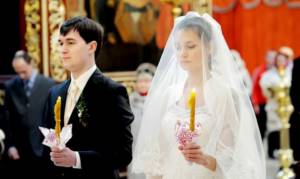
For three days before the wedding, the bride and groom organize a fast of two types: for the body (you can only eat lean food) and for the soul. These days you cannot eat fast food (meat, dairy products and eggs). Some priests advise not to eat fish dishes. You can eat raw and boiled vegetables, porridge with vegetable oil or with nuts, soups seasoned with vegetable oil, and fruits.
Spiritual fasting consists of not gossiping, not swearing and quarreling, not watching obscene films, not having sex. Instead of films and secular literature, you need to read spiritual books and the Gospel.
If you adhere to such truths, then fasting will be correct.
But not all people can fast. For example, if a person is sick or does heavy physical labor, he is given relief - the priest may allow dairy or fish dishes.
So, now we know when we can get married in church and how to fast.
Why fast on the eve of a wedding?
Fasting is not so much an abstinence from eating food as it is a spiritual cleansing and renewal, an opportunity to start your new married life on a good note . In addition to food restrictions, it combines avoidance of everything that distracts thoughts: social networks, TV, entertainment events, etc. At this time, you should turn to God, focusing on work, prayer, self-improvement and reading Orthodox books.
It is better to refrain from quarrels and conflicts, envy and pride, in a word - to behave decently when preparing for the sacrament
Of course, with a work schedule in the hectic modern world, it is not always possible to distance yourself from everything, but the purpose of fasting is to follow it to the best of your ability and ability, striving for the spiritual, not the material.

Swearing before the wedding
Unfortunately, many new church people perceive fasting solely as abstaining from food, which is essentially not the case. At the very least, diet alone cannot be called fasting without due effort aimed at cleansing, first of all, the soul, not the body. The purpose of fasting is to learn humility and abstinence, which should apply not only to diet, but to all aspects of life.
A wedding is not only a beautiful ceremony, but also a sacrament, the union of spouses in eternal life . Naturally, you need to prepare for it in a certain way, including fasting.
Depth of feelings
This is what it is like – a wedding in a church. Preparation for it carries not so much an external meaning, expressed in the efforts of arranging the ritual environment, but an internal, spiritual one. Love and infatuation are far from the same thing. Love is deep, not superficial and capable of strong actions. Love thunders loudly, ignites quickly, is hot to the point of burning, but cools down as soon as it encounters a small obstacle to its combustion.
Much more can be said on this topic, but hardly anyone will say better about love than the Apostle Paul said... Read these words, find them, they are impressive and convicting at the same time. The beginning is: “Love is patient and kind, love does not envy, love does not boast, it is not proud...”
An important sacrament
Enough literature has been written about how to prepare for a wedding in the Orthodox Church, which you can easily purchase at church or borrow from the church library.
Previously, the wedding rite itself included the communion of future spouses. This suggests that the wedding took place during the Divine Liturgy. Marriage is a great Sacrament, thanks to which husband and wife become, as it were, one body; they are united together in Jesus Christ for salvation and entry into eternal life. Today, communion is no longer included in the sacrament of marriage, but the meaning itself has not lost its meaning. All the same young people become one in Christ. Therefore, before the wedding, future spouses need to go to the Divine Liturgy and receive communion. Before communion, of course, a person fasts and confesses.
Not only newlyweds go to get married, often married couples who have been married for a long time resort to this sacrament. It is worth saying that preparing for a wedding for married people is no different from preparing for those who are just planning to follow this path. Is it possible that in conversations with a priest the conversation may go in a slightly different direction, because these people are already husband and wife before God, although they live without blessing. Such couples may be more conscious and responsible about the sacrament.
